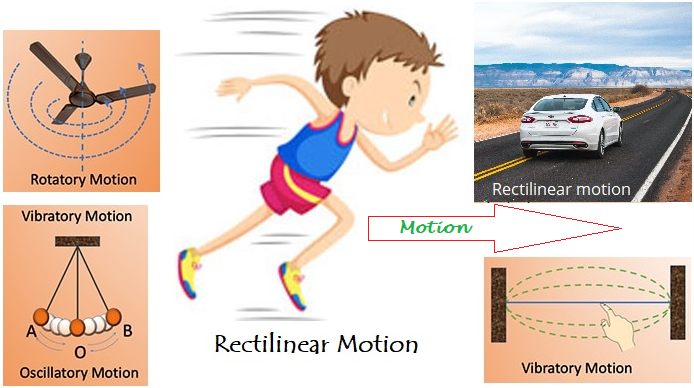Motion Notes Class 9
Hello, readers ! Here on this webpage you can learn important concepts of chapter-08 ‘motion’ and can get class notes, NCERT question solutions, NCERT in-text question solutions, other important question-answers and can participate in quizzes for motion..
Motion: If the position of a body changes with respect to its surroundings with respect to time, then the body is said to be in a state of motion otherwise rest.
Nobody in the universe is in a state of absolute rest or motion. Rest and motion are relative terms, and defined on the basis of the surrounding or reference point, which may be stationary or in a moving condition.
Table of Contents
Chapter – 08 Motion Index
| Sr. No. | Topic |
|---|---|
| 1 | Rest and Motion |
| 2 | Distance and Displacement |
| 3 | Speed and Velocity |
| 4 | Acceleration |
| 5 | Uniform motion and non-uniform motion |
| 6 | Equations of motion |
| 7 | Motion under Gravity |
| 8 | Motion Graphs |
| 9 | Circular Motion |

Important Questions
What is motion?
Answer: If the position of a body changes with respect to its surroundings with respect to time, then the body is said to be in a state of motion. It can be described using terms such as speed, velocity, and acceleration.
Are rest and motion are absolute terms or relative term ?
Answer: Rest and motion are relative terms, and defined on the basis of the surrounding or reference point, which may be stationary or in a moving condition. Nobody in the universe is in a state of absolute rest or motion.
What is the difference between speed and velocity?
Answer: Speed is a scalar quantity that refers to the rate at which an object covers distance. Velocity, on the other hand, is a vector quantity that refers to the rate at which an object changes its position in a particular direction.
What is acceleration?
Answer: Acceleration is the rate at which an object changes its velocity over time. It can be either positive (speeding up) or negative (slowing down).
What is Newton’s first law of motion?
Answer: Newton’s first law of motion, also known as the law of inertia, states that an object at rest will remain at rest, and an object in motion will remain in motion with a constant velocity, unless acted upon by an external force.
What is the difference between uniform and non-uniform motion?
Answer: Uniform motion refers to motion at a constant speed in a straight line. Non-uniform motion, on the other hand, refers to motion that is not at a constant speed or that involves changes in direction.
What is the difference between distance and displacement?
Answer: Distance is a scalar quantity that refers to the total path length traveled by an object. Displacement, on the other hand, is a vector quantity that refers to the change in position of an object from its initial to its final position, regardless of the path taken.
What is the difference between average speed and instantaneous speed?
Answer: Average speed is the total distance traveled by an object divided by the time taken to travel that distance. Instantaneous speed, on the other hand, is the speed of an object at a particular instant in time. It can be calculated by measuring the distance traveled over a very short time interval.
Click here 🖱️👉 Motion Class 9 Quiz-1
Click here 🖱️👉 Motion Graphs Class 9 Quiz-2
Click here 🖱️👉 Motion NCERT Questions Solution
Click here 🖱️👉 Motion NCERT in-text Questions Solution
Other chapters Quiz 🖱️👉: Force and Laws of Motion QUIZ-1
Pages
Next Chapter Notes 👉🖱 Chapter 10 Gravitation
MY YouTube Channel Link : 👉🖱 https://www.youtube.com/channel/UCGpC7nWE0-bBv9I53MM8qjQ
Motion Notes Class 9, Motion Notes Class 9, Motion Notes Class 9, Motion Notes Class 9, Motion Notes Class 9, Motion Notes Class 9, Motion Notes Class 9, Motion Notes Class 9, Motion Notes Class 9, Motion Notes Class 9, Motion Notes Class 9, Motion Notes Class 9